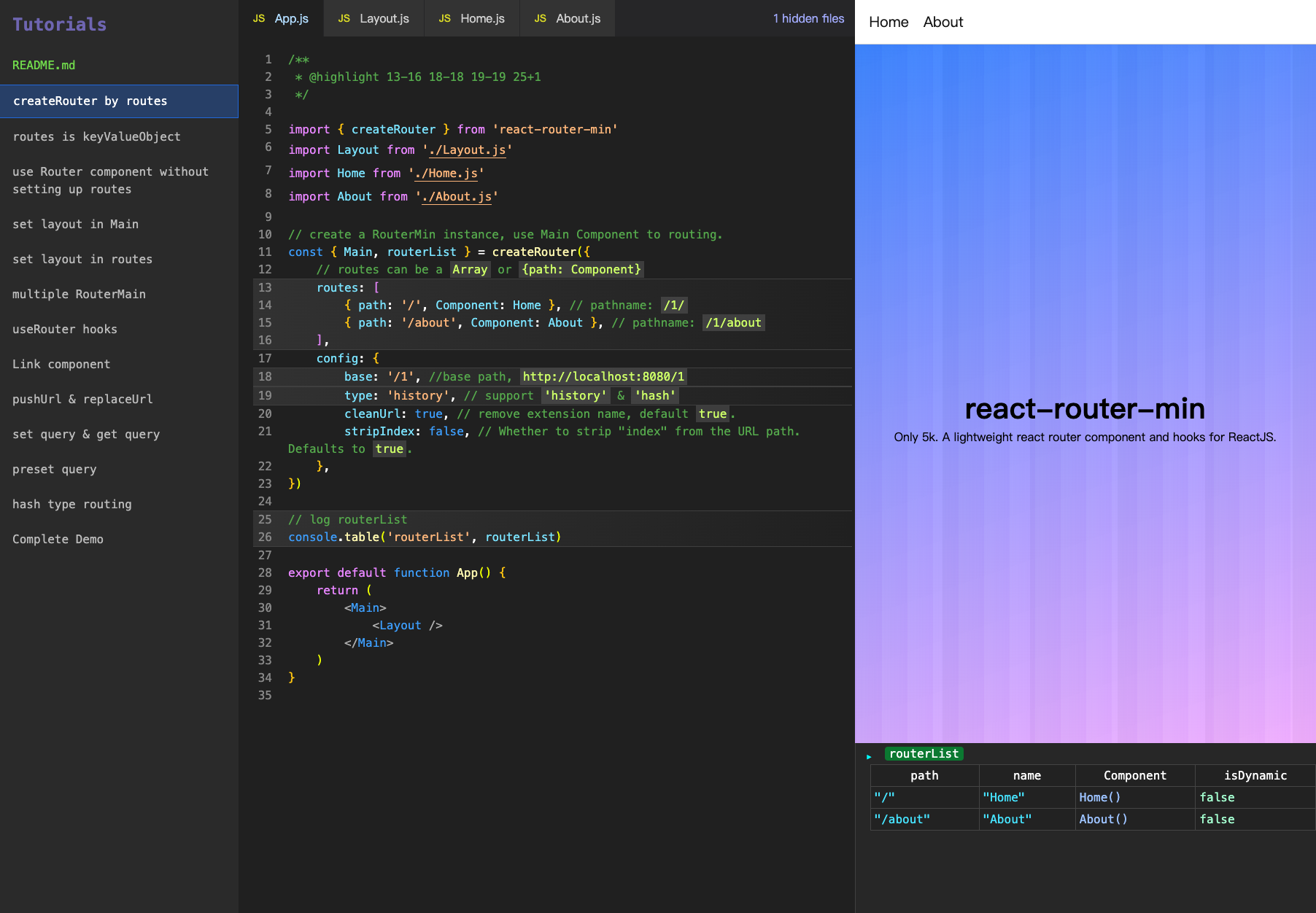react-router-min
Only 5k. A lightweight react router component and hooks for ReactJS.
Usage
npm install react-router-minES Module
// App.js
import { createRouter } from 'react-router-min'
const { Main } = createRouter({
routes: [{ path: '/', Component: Home }],
config: { type: 'history', cleanUrl: true, stripIndex: false },
})
function App() {
return <Main />
}UMD file
<script src="https://unpkg.com/react-router-min/lib/index.umd.js"></script>Learn by Demos
Follow tutorial to learn how to use react-router-min
git clone https://github.com/billypc025/react-router-min.git
cd react-router-min && npm install
npm run demo
Reference
createRouter
react-router-min supports multiple router instances. Use createRouter to create a router instance, and each instance works independently.
import { createRouter } from 'react-router-min'
// create Router instance
const {
Link, // create a Link component
Main, // create Router Main component
Router, // create Router component
useRouter, // create a useRouter Hooks (Can obtain the parsed `path` and `query`)
pushUrl, // push state url for function call
replaceUrl, // replace state url for function call
routerList, // generate a path list based on routes
} = createRouter({ routes, config })Configuring Routes
routes can be Array of Record, routes is not required.
// Array type, with children
createRouter({
routes: [
{
path: '/',
Component: Root,
children: [
{ index: true, Component: Home },
{ path: 'about', Component: About },
{
path: 'auth',
Component: AuthLayout,
children: [
{ path: 'login', Component: Login },
{ path: 'register', Component: Register },
],
},
{
path: 'concerts',
children: [
{ index: true, Component: ConcertsHome },
{ path: ':city', Component: ConcertsCity },
{ path: 'trending', Component: ConcertsTrending },
],
},
],
},
],
})// Flattened Array
createRouter({
routes: [
{ path: '/', Component: Home },
{ path: '/about', Component: About },
{ path: '/auth', Component: AuthLayout },
{ path: '/auth/login', Component: Login },
{ path: '/auth/register', Component: Register },
{ path: '/concerts/', Component: ConcertsHome },
{ path: '/concerts/city', Component: ConcertsCity },
{ path: '/concerts/trending', Component: ConcertsTrending },
],
})// Record type
createRouter({
routes: {
'/': Home,
'/about': About,
'/auth': AuthLayout,
'/auth/login': Login,
'/auth/register': Register,
'/concerts/': ConcertsHome,
'/concerts/city': ConcertsCity,
'/concerts/trending': ConcertsTrending,
},
})dynamic routes
- Bind path to
VariableName
// URL: https://domain.com/foo/1/article?id=xxxxx
//-- routes --
const routes = { '/foo/[category]/article': ArticleComponent }
//-- ArticleComponent.js --
function ArticleComponent({ category }) {
console.log(category)
//=> '1'
return '...'
}- path is
SegmentName
// URL: https://domain.com/foo/1/2/article?id=xxxxx
//-- routes --
const routes = { '/foo/[...tags]/article': ArticleComponent }
//-- ArticleComponent.js --
function ArticleComponent({ tags }) {
console.log(tags)
//=> ['1', '2']
return '...'
}Configuration for the router behavior
const { Main } = createRouter({
config: { base: '', type: 'history', cleanUrl: true, stripIndex: true },
})config.baserouter base pathname. Defaults to'', useful for Micro-FE.config.presetQuerypreset query record, forever existing, can be covered.config.typeThe type of routing to use, either 'history' or 'hash'. Defaults to'history'config.cleanUrlWhether to clean the URL by removing extension name. Defaults totrue.config.stripIndexWhether to strip "index" from the URL path. Defaults totrue.
Main component
The page component must be wrapped by the Main component.
const { Main } = createRouter({ routes })
function App() {
return (
<Main>
<Layout />
</Main>
)
}Link component
Link component return <a/>, but prevented default event to make SPA. Usage is same as <a/>.
There are two ways to import.
import from instance return by creatRouter (recommend)
//-- AppRouter.js -- import { createRouter } from 'react-router-min' const { Main, Link } = createRouter() export { Link, Main as default }//-- PageComponent.js -- import { Link } from './AppRouter.js' function PageComponent() { return ( <> <Link href='/foo'>foo</Link> {/* replace state link */} <Link href='/foo' type="replace">foo</Link> {/* with query */} <Link href='/foo?n=1'>foo</Link> <Link href='/foo' query={{ a:1 }}>foo</Link> </> ) }import directly from
'react-router-min'import { Link } from 'react-router-min' function PageComponent() { return ( <> <Link href='/foo'>foo</Link> {/* replace state link */} <Link href='/foo' type="replace">foo</Link> {/* with query */} <Link href='/foo?n=1'>foo</Link> <Link href='/foo' query={{ a:1 }}>foo</Link> {/* need to manually pass base */} <Link href='/foo' options={{ base: '/base' }}>foo</Link> {/* need to manually pass router type */} <Link href='/foo' options={{ type: 'hash' }}>foo</Link> </> ) }
useRouter hooks
- useRouter Hooks can obtain the parsed
pathandquery
// URL: https://domain.com/foo?a=1
function PageComponent() {
const { path, query } = useRouter()
console.log({ path, query })
// => { path: '/foo', query: { a: 1 } }
return '...'
}- hash type router
// URL: https://domain.com/#/foo?a=1
function PageComponent() {
const { path, query } = useRouter()
console.log({ path, query })
// => { path: '/foo', query: { a: 1 } }
return '...'
}- When the base is set, path starts from after the base.
// URL: https://domain.com/base/foo?a=1
//-- router.js --
const { Main } = createRouter({ routes, config: { base: '/base' } })
//-- PageComponent.js --
function PageComponent() {
const { path, query } = useRouter()
console.log({ path, query })
// => { path: '/foo', query: { a: 1 } }
return '...'
}pushUrl & replaceUrl
Function to push or replace a new URL to the history stack. There are two ways to import.
import from instance return by creatRouter (recommend)
imported in this way will automatically apply the config preset by creatRouter
//-- AppRouter.js -- import { createRouter } from 'react-router-min' const { Main, pushUrl } = createRouter({ routes: [ { path: '/', Component: Home }, { path: '/foo', name: 'foo', Component: PageComponent }, ], }) export { pushUrl, Main as default }//-- function call in PageComponent -- import { pushUrl } from './AppRouter.js' pushUrl('/foo') pushUrl('/foo?a=1') pushUrl('/foo?a=1', { query: { b: 2 } }) pushUrl({ path: '/foo', query: { a: 1 } }) pushUrl({ name: 'foo', query: { a: 1 } }) // by nameusage of replaceURL is the same as pushURL.
import directly from
'react-router-min'imported in this way, need to manually pass some configurations.
import { pushUrl } from 'react-router-min' pushUrl('/foo') pushUrl('/foo?a=1') pushUrl('/foo?a=1', { query: { b: 2 } }) pushUrl({ path: '/foo', query: { a: 1 } }) pushUrl({ name: 'foo', query: { a: 1 } }) // by name // need to manually pass base pushUrl('/foo', { base: '/base' }) // need to manually pass router type pushUrl('/foo', { type: 'hash' })